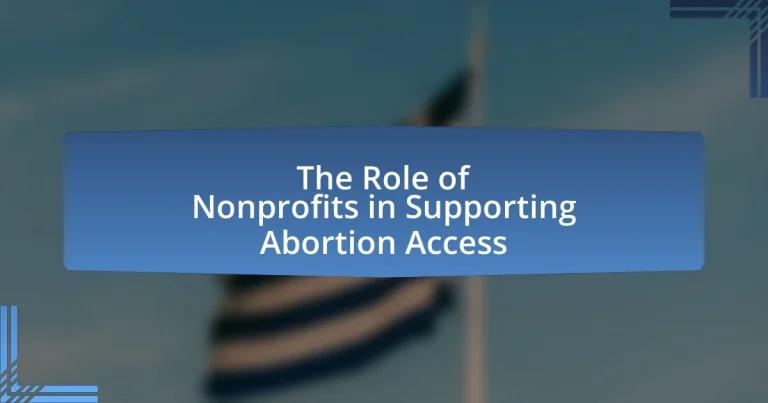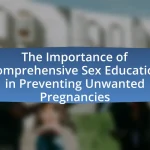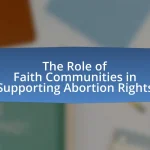Nonprofits play a vital role in supporting abortion access by providing essential services such as financial assistance, education, and advocacy. They help individuals overcome socioeconomic barriers to accessing abortion care, offer logistical support, and engage in public education to raise awareness about reproductive rights. Additionally, these organizations actively lobby for policy changes to protect and expand abortion access, addressing challenges such as legal restrictions and geographic disparities in service availability. Various types of nonprofits, including reproductive health organizations and advocacy groups, work collaboratively to ensure that individuals have the necessary resources and support to make informed decisions about their reproductive health.
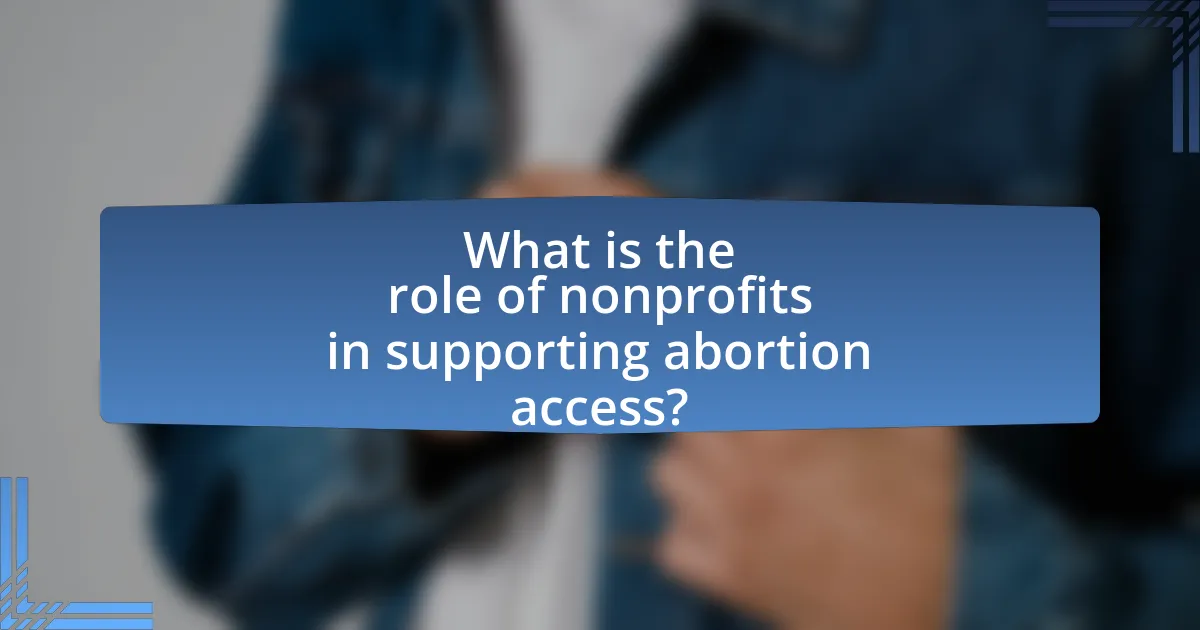
What is the role of nonprofits in supporting abortion access?
Nonprofits play a crucial role in supporting abortion access by providing essential services such as funding, education, and advocacy. These organizations often offer financial assistance to individuals seeking abortions, helping to cover costs that may be prohibitive due to socioeconomic barriers. For instance, the National Network of Abortion Funds reports that they have helped thousands of individuals access necessary care by providing direct financial support. Additionally, nonprofits engage in educational outreach to inform communities about reproductive rights and available services, thereby empowering individuals to make informed choices. Advocacy efforts by these organizations also aim to influence policy and protect abortion rights, as seen in campaigns led by groups like Planned Parenthood, which has been instrumental in fighting against restrictive legislation.
How do nonprofits contribute to abortion access?
Nonprofits contribute to abortion access by providing essential services such as funding, education, and direct healthcare. Organizations like Planned Parenthood and the National Abortion Federation offer financial assistance to individuals seeking abortions, ensuring that cost does not become a barrier. Additionally, these nonprofits educate the public about reproductive rights and available services, increasing awareness and understanding of abortion options. According to the Guttmacher Institute, in 2020, 86% of U.S. counties had no abortion provider, highlighting the critical role nonprofits play in filling these gaps by offering clinics and telehealth services. Through advocacy efforts, nonprofits also work to influence legislation that protects and expands access to abortion services, demonstrating their multifaceted contribution to reproductive healthcare.
What specific services do nonprofits provide to support abortion access?
Nonprofits provide a range of specific services to support abortion access, including financial assistance for abortion procedures, transportation services to clinics, and counseling for individuals seeking abortions. These organizations often help cover the costs associated with the procedure, which can be a significant barrier for many individuals. For example, the National Network of Abortion Funds reports that they have helped thousands of individuals by providing funds for abortions and related expenses. Additionally, nonprofits may offer logistical support, such as arranging travel and accommodation for those who need to travel long distances to access care. They also provide emotional and psychological support through counseling services, ensuring that individuals have access to the necessary resources and information to make informed decisions about their reproductive health.
How do nonprofits advocate for abortion rights?
Nonprofits advocate for abortion rights through various strategies, including public education, lobbying for policy changes, and providing direct services. These organizations often conduct awareness campaigns to inform the public about reproductive rights and the importance of access to safe abortion services. For instance, the Guttmacher Institute reports that comprehensive sex education and access to contraceptives can significantly reduce the need for abortions, highlighting the role of nonprofits in promoting preventive measures. Additionally, nonprofits engage in legislative advocacy by lobbying lawmakers to support pro-choice policies and opposing restrictive laws. They also offer direct support services, such as funding for clinics and providing resources for individuals seeking abortions, which reinforces their commitment to ensuring access to reproductive healthcare.
Why are nonprofits essential in the context of abortion access?
Nonprofits are essential in the context of abortion access because they provide critical services, education, and advocacy that facilitate reproductive health choices. These organizations often fill gaps left by government and private healthcare systems, offering financial assistance, counseling, and logistical support to individuals seeking abortions. For instance, according to the Guttmacher Institute, nonprofits like Planned Parenthood serve millions of patients annually, ensuring access to safe and legal abortion services, particularly in underserved areas. Additionally, nonprofits engage in advocacy efforts to protect reproductive rights, mobilizing communities and influencing policy changes that safeguard access to abortion services.
What challenges do individuals face in accessing abortion services?
Individuals face multiple challenges in accessing abortion services, including legal restrictions, financial barriers, and lack of availability. Legal restrictions vary by state, with some areas imposing waiting periods, mandatory counseling, and gestational limits that complicate access. Financial barriers arise from the high costs of procedures, which are often not covered by insurance, particularly in states with restrictive laws. Additionally, many individuals encounter logistical challenges, such as the distance to clinics, which can be exacerbated in rural areas where services are limited. According to the Guttmacher Institute, 90% of U.S. counties lack an abortion provider, highlighting the significant geographic disparities in access.
How do nonprofits address these challenges?
Nonprofits address challenges in supporting abortion access by providing essential services such as funding for clinics, advocacy for policy changes, and education on reproductive health. For instance, organizations like Planned Parenthood offer financial assistance to individuals seeking abortions, ensuring that cost does not become a barrier. Additionally, nonprofits engage in lobbying efforts to influence legislation that protects reproductive rights, as seen in various states where they have successfully campaigned against restrictive laws. Furthermore, they conduct outreach programs to educate communities about available resources and reproductive health options, which is crucial in areas with limited access to information. These multifaceted approaches demonstrate how nonprofits effectively tackle the challenges surrounding abortion access.
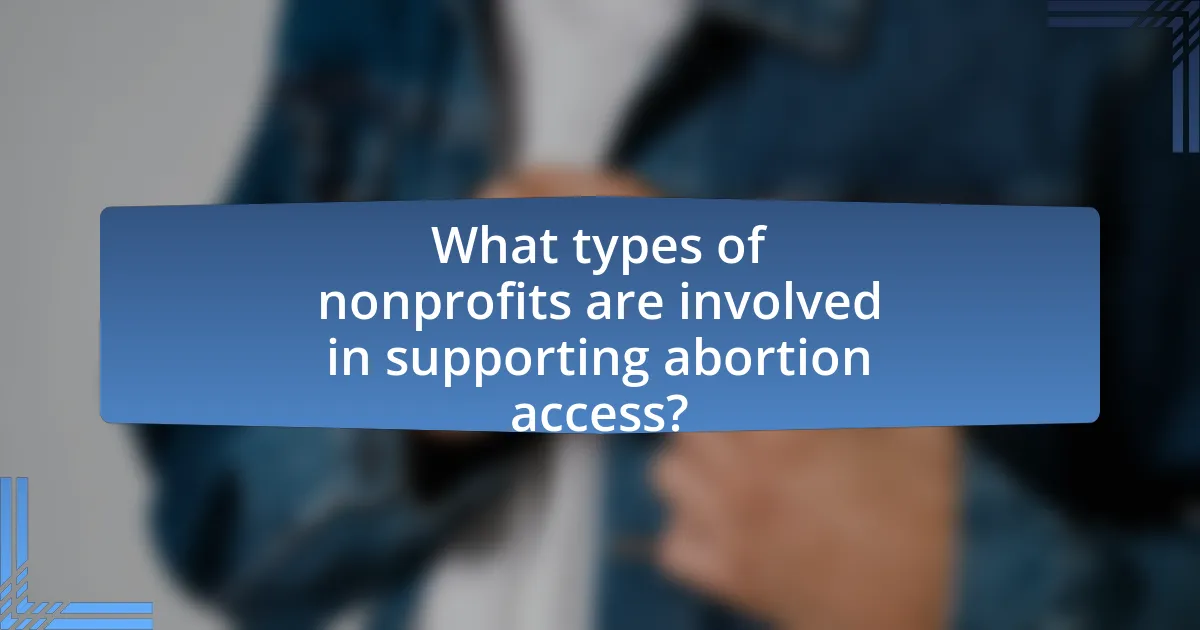
What types of nonprofits are involved in supporting abortion access?
Various types of nonprofits are involved in supporting abortion access, including reproductive health organizations, advocacy groups, and direct service providers. Reproductive health organizations, such as Planned Parenthood, offer medical services and education related to abortion. Advocacy groups, like the National Abortion Federation, work to protect and promote abortion rights through policy initiatives and public awareness campaigns. Direct service providers, including local clinics and funds, assist individuals in accessing abortion services, often providing financial assistance and logistical support. These nonprofits collectively contribute to ensuring that individuals have the necessary resources and support to access abortion care.
What are the different categories of nonprofits focused on abortion access?
Nonprofits focused on abortion access can be categorized into several distinct types: reproductive health organizations, advocacy groups, direct service providers, and educational nonprofits. Reproductive health organizations, such as Planned Parenthood, provide medical services including abortions and contraceptive care. Advocacy groups, like the National Abortion Federation, work to influence policy and protect abortion rights. Direct service providers, including local clinics, offer immediate access to abortion services and support. Educational nonprofits focus on raising awareness and providing information about reproductive rights and health options. These categories reflect the diverse approaches nonprofits take to ensure access to abortion services and support reproductive rights.
How do reproductive health organizations operate in this space?
Reproductive health organizations operate by providing essential services, education, and advocacy to support abortion access. These organizations often offer clinical services such as counseling, medical procedures, and follow-up care, ensuring that individuals have safe and legal options for abortion. For instance, the Guttmacher Institute reports that in 2020, nearly 90% of U.S. counties lacked an abortion provider, highlighting the critical role these organizations play in filling service gaps. Additionally, they engage in public education campaigns to raise awareness about reproductive rights and mobilize community support, which is vital in regions with restrictive laws. Through policy advocacy, these organizations work to influence legislation and protect access to reproductive health services, as evidenced by their involvement in legal challenges against restrictive abortion laws.
What role do advocacy groups play in supporting abortion access?
Advocacy groups play a crucial role in supporting abortion access by mobilizing public opinion, influencing policy, and providing resources for individuals seeking abortion services. These organizations, such as Planned Parenthood and the National Abortion Federation, actively campaign for reproductive rights, educate the public about abortion options, and work to eliminate legal barriers. For instance, according to a report by the Guttmacher Institute, states with strong advocacy groups tend to have more comprehensive reproductive health services and fewer restrictions on abortion access. This demonstrates that advocacy groups are instrumental in shaping a supportive environment for abortion access through legislative efforts and community outreach.
How do community-based organizations contribute to abortion access?
Community-based organizations enhance abortion access by providing essential services such as education, counseling, and financial assistance. These organizations often serve as local resources, offering information about available options and navigating the healthcare system. For instance, a study by the Guttmacher Institute found that community organizations play a critical role in connecting individuals with healthcare providers and facilitating transportation to clinics, which is vital in areas with limited access. Additionally, they often mobilize grassroots advocacy efforts to influence policy changes that protect and expand abortion rights, demonstrating their significant impact on improving access to reproductive healthcare.
What local initiatives are led by nonprofits to enhance access?
Local initiatives led by nonprofits to enhance access to abortion services include mobile clinics, community education programs, and financial assistance for low-income individuals. For example, organizations like Planned Parenthood and the National Abortion Federation operate mobile units that travel to underserved areas, providing essential reproductive health services directly to communities. Additionally, nonprofits often conduct outreach and education campaigns to inform individuals about their reproductive rights and available services, which is crucial in areas with limited access to healthcare. Financial assistance programs offered by nonprofits help cover the costs of procedures and travel for those who cannot afford them, thereby reducing barriers to access. These initiatives collectively aim to ensure that individuals have the necessary resources and information to make informed choices regarding their reproductive health.
How do these organizations engage with the communities they serve?
Organizations supporting abortion access engage with the communities they serve through outreach programs, education initiatives, and direct services. For instance, many nonprofits conduct community workshops to inform individuals about reproductive rights and available services, thereby increasing awareness and accessibility. Additionally, these organizations often collaborate with local health providers to offer comprehensive care, including counseling and medical services, which directly addresses community needs. Evidence of their impact can be seen in studies showing that areas with active nonprofit engagement report higher rates of informed decision-making regarding reproductive health options.
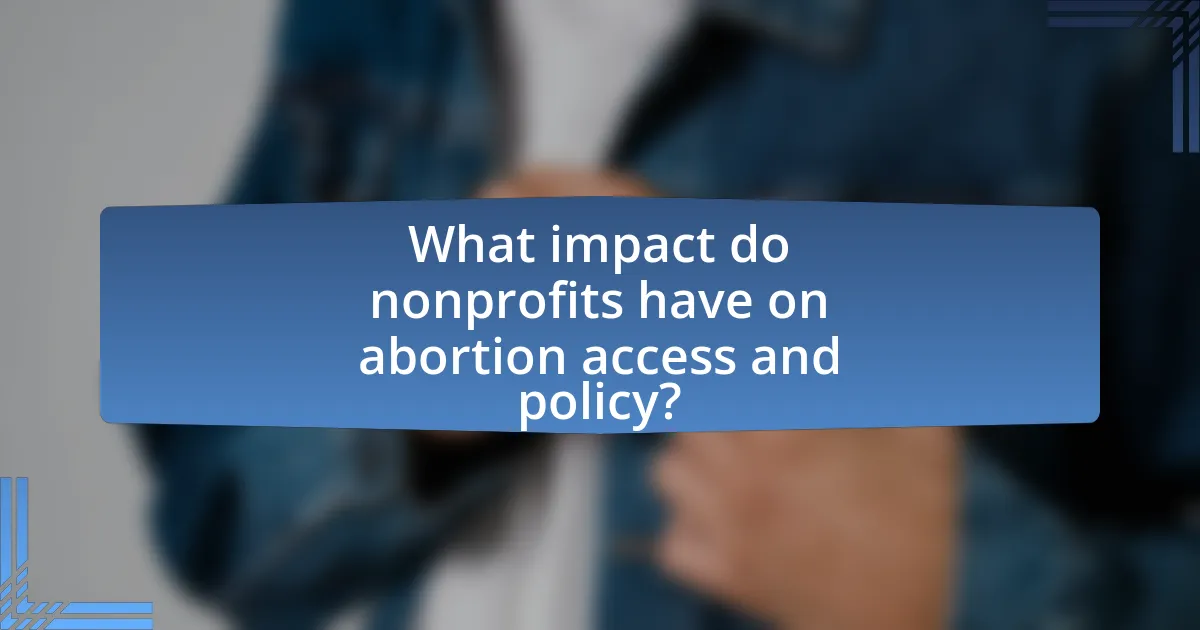
What impact do nonprofits have on abortion access and policy?
Nonprofits significantly influence abortion access and policy by providing essential services, advocacy, and education. Organizations such as Planned Parenthood and the National Abortion Federation offer medical services, including abortions, and comprehensive reproductive health care, which directly increases access for individuals seeking these services. Additionally, nonprofits engage in policy advocacy, lobbying for reproductive rights and against restrictive laws, thereby shaping the legal landscape surrounding abortion. For instance, according to the Guttmacher Institute, states with strong nonprofit advocacy efforts tend to have more supportive abortion policies and greater access to services. This demonstrates that nonprofits play a crucial role in both facilitating access to abortion and influencing the policies that govern it.
How do nonprofits influence public policy regarding abortion?
Nonprofits influence public policy regarding abortion primarily through advocacy, education, and lobbying efforts. These organizations mobilize resources to raise awareness about reproductive rights, provide factual information, and engage in grassroots campaigns that shape public opinion and legislative agendas. For instance, organizations like Planned Parenthood and the National Abortion Federation actively lobby lawmakers, participate in public hearings, and collaborate with coalitions to promote policies that protect and expand access to abortion services. Their efforts are supported by research indicating that states with strong nonprofit advocacy networks tend to have more favorable abortion policies, as seen in studies conducted by the Guttmacher Institute, which highlight the correlation between nonprofit activity and legislative outcomes.
What strategies do nonprofits use to lobby for abortion rights?
Nonprofits employ various strategies to lobby for abortion rights, including grassroots mobilization, coalition building, and targeted advocacy campaigns. Grassroots mobilization involves organizing community members to participate in rallies, phone banks, and letter-writing campaigns to influence policymakers. Coalition building allows nonprofits to unite with other organizations, amplifying their voice and resources to advocate for shared goals. Targeted advocacy campaigns focus on specific legislation or political figures, utilizing data-driven messaging and public relations efforts to sway public opinion and legislative outcomes. For example, organizations like Planned Parenthood have effectively used these strategies to secure funding and protect reproductive rights at both state and federal levels.
How effective are these strategies in changing legislation?
These strategies are highly effective in changing legislation related to abortion access. Nonprofits leverage grassroots mobilization, advocacy campaigns, and coalition-building to influence policymakers and public opinion. For instance, organizations like Planned Parenthood have successfully lobbied for reproductive rights legislation, resulting in the passage of laws that expand access to abortion services in various states. Research indicates that states with active nonprofit advocacy see a higher likelihood of progressive legislation being enacted, as evidenced by the increased number of protective laws passed in states with strong nonprofit networks.
What measurable outcomes result from nonprofit efforts in abortion access?
Nonprofit efforts in abortion access result in increased availability of services, improved health outcomes, and enhanced public awareness. For instance, organizations like Planned Parenthood report that they provide millions of services annually, including over 300,000 abortions, which directly increases access to safe procedures. Additionally, studies indicate that areas served by nonprofits experience lower rates of maternal mortality and morbidity, demonstrating improved health outcomes. Furthermore, nonprofits engage in educational campaigns that raise awareness about reproductive rights, leading to increased public support for abortion access, as evidenced by surveys showing a rise in pro-choice sentiment in communities served by these organizations.
How do nonprofits track their impact on abortion access?
Nonprofits track their impact on abortion access through data collection, client feedback, and outcome measurement. They utilize surveys and interviews to gather qualitative and quantitative data from individuals who seek their services, assessing changes in access and outcomes. For instance, organizations like Planned Parenthood report on the number of patients served, types of services provided, and follow-up care outcomes, which are often published in annual reports. Additionally, nonprofits may collaborate with research institutions to conduct studies that evaluate the effectiveness of their programs, providing evidence of their impact on community health and access to reproductive services.
What success stories illustrate the effectiveness of nonprofits in this area?
Nonprofits have effectively supported abortion access through various success stories, notably the work of organizations like Planned Parenthood and the National Abortion Federation. Planned Parenthood has provided millions of individuals with access to reproductive health services, including abortion, serving over 2.4 million patients annually. The National Abortion Federation has successfully advocated for safe and legal abortion services, offering support to over 1,000 member clinics and ensuring that patients receive care even in restrictive environments. These organizations have also played critical roles in legal battles, helping to maintain access to abortion services in numerous states, demonstrating their effectiveness in safeguarding reproductive rights.
What can individuals do to support nonprofits in their efforts?
Individuals can support nonprofits in their efforts by donating money, volunteering time, and advocating for their causes. Financial contributions provide essential resources for nonprofits to operate and expand their services, while volunteering allows individuals to directly engage with the community and assist in various programs. Advocacy efforts, such as raising awareness and mobilizing others, can amplify the nonprofit’s message and influence policy changes. According to a report by the National Council of Nonprofits, 70% of nonprofits rely on donations to fund their operations, highlighting the critical role of individual support in sustaining these organizations.
